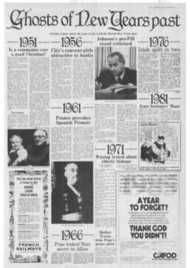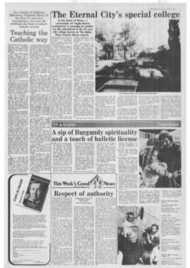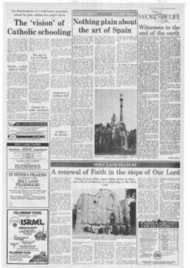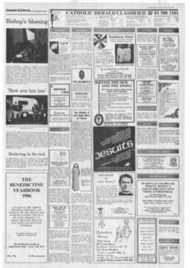Page 6, 27th December 1985
Page 6

Report an error
Noticed an error on this page?If you've noticed an error in this article please click here to report it.
Tags
Share
Related articles
Children's Books
Alice And Arthur In Santa's Sack
Remembrance Sunday Will Not Fade Away
The Beardsley Who Longed To Be Back In The Brompton Oratory
One Of Our War Memorials Is Missing
Childhood memory lane Children of the Blitz by Robert Westall (Viking, £9.95)
THIS is a large book, handsomely illustrated with photographs and a few cartoons and posters, of wartime memories by people who were children during the second World War. Ten years ago the author published his first novel, a story about wartime children who stole a machinegun from a crashed German plane, The Machinegunners. Afterwards, letters poured in From people who remembered adventures just as hair-raising; or even everyday life, which in a sense was all adventurous then.
Out of these adult memories of wartime Britain, and others, he has compiled an anthology of experiences, partly chronological, partly arranged in subjects.
Evacuation affected children more directly and more poignantly than any other single wartime event. State schools in bombable cities were sent to safe country areas, and an entire generation of working-class children was separated for the first time from home, parents, in many cases its culture and mores. I say "for the first time" because it was a peculiarly working-class trauma, this separation.
In the public school classes it was routine for children, boys in particular, to be sent away from home and family to school at eight or so; but the working class suffered no such deprivation, until the war.
Differences between the classes, and between town and country were so much greater in those days than they arc now that it is probably hard for anyone horn since to imagine the "foreignness" of evacuees to their rural hosts, and vice versa, or the profound social and cultural shocks all round. No television opened people's eyes to the difference between their lifestyle and that of others.
This is a lively book rather than a deep one. Robert Westall's own books are so good and his occasional comments in this one so pungent that I wish he had used the entries to write a book of his own on the subject of wartime childhood, linking the anecdotes, using this material, but making more out of it, knitting it together with his own imaginative force.
As it is, though interesting and very readable, if disappoints a little because those writing the hulk of it are not particularly good writers. Still, it has a good deal of documentary value.
Isabel Quigly
blog comments powered by Disqus











